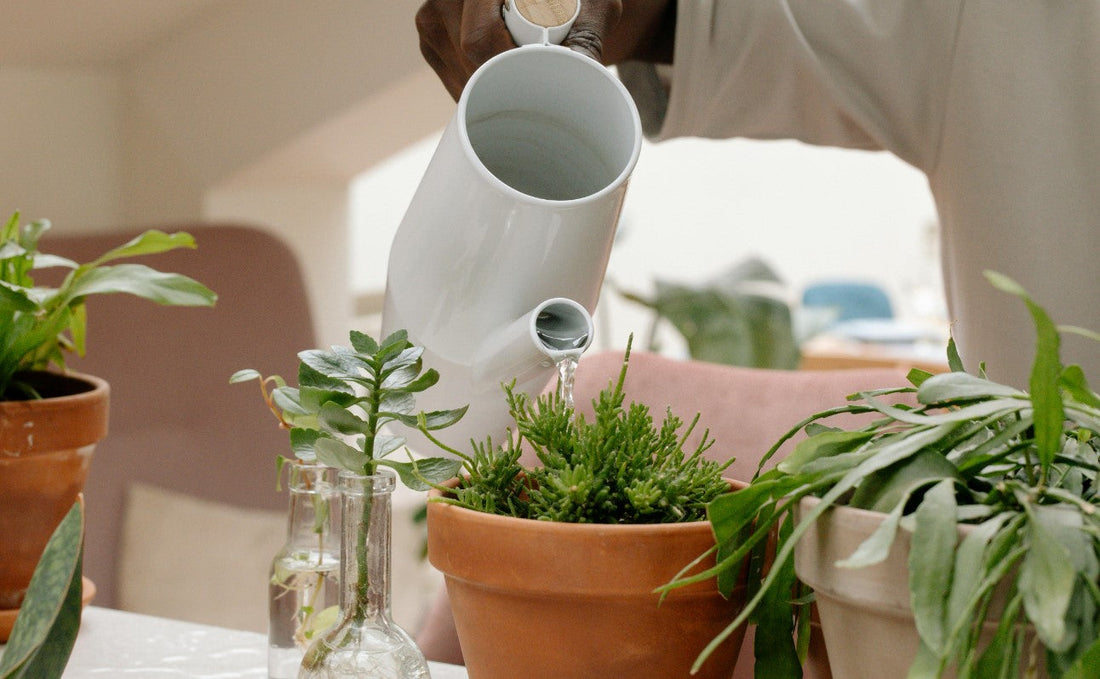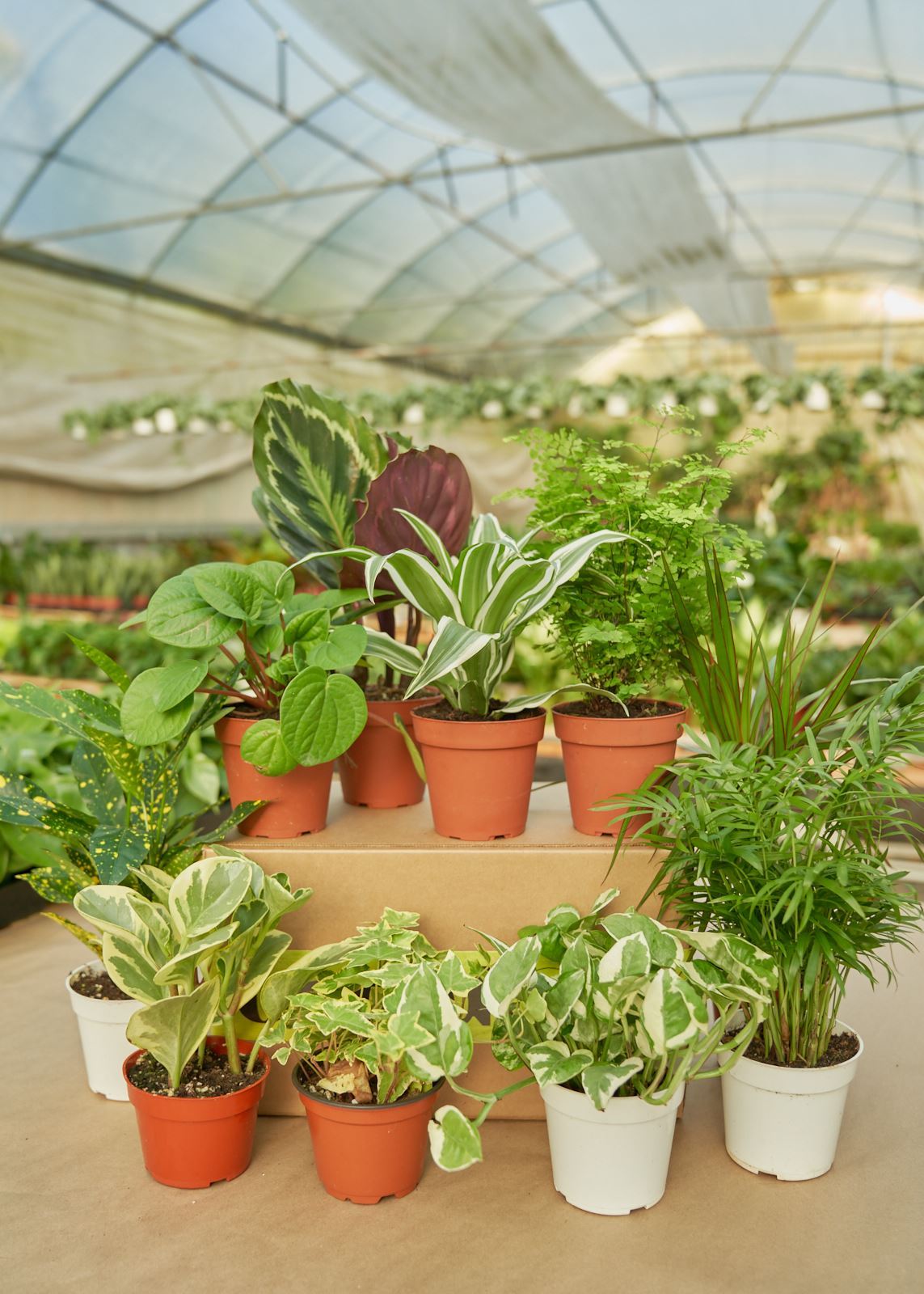How to Make Tap Water Safe for Plants

Houseplants require more than just a good soil mix, adequate sunlight, and the right-sized pot to stay healthy. Water is another key requirement for their healthy growth. While tap water is the first choice for many plant parents due to its round-the-clock availability, it’s well known that it may contain chemicals that can harm your green companions. So, is tap water good for plants?
Get the answer in this comprehensive guide, along with practical tips on how to make tap water safe for plants. You’ll also learn what alternatives to use for your beloved indoor greenery.
Can You Water Plants With Tap Water?

Yes, in general, you can water plants with tap water. It’s not only convenient but also a low-cost option, containing various beneficial minerals, such as calcium and magnesium, naturally present. There is one condition, however. You just need to let it sit for at least 24 hours so it can become free from chemicals like chlorine and fluoride added during water treatment processes.
Is Tap Water Safe for Plants?
Look, water running from our taps isn’t poisonous. So, why is tap water considered bad for plants? Different chemicals are added during water treatment processes that can affect tap water quality and can hurt your houseplants. Also, there is always the possibility of having contaminants in your tap water. Last but not least, the tap water in your location may be too soft, too hard, or too alkaline (with a pH above 7). Since most plants like pH levels between 5 and 7, anything outside this can risk their health.
What Contaminants Are in Tap Water?
Common tap water contaminants include copper, lead, nitrate, microplastics, Per- and Polyfluoroalkyl Substances (PFAS), VOCs (Volatile Organic Compounds), organic pathogens, traces of disinfectants and pharmaceutical products, etc. These pollutants can enter our water systems from industrial or farming pollution, rusted copper water pipes, lead pipes, brass fixtures, fertilizers, septic systems, and consumer products.
How Do You Make Tap Water Safe for Plants?

There are different ways to make tap water safe for plants. For example, you can remove chemicals like chlorine and fluoride, lower the pH of tap water if it’s too high, use a water conditioner, install a filtration system in your home, get a water filter jug, or water your plants with rainwater or distilled water.
How to Remove Chlorine From Tap Water for Plants
Here’s how to dechlorinate tap water for plants:
- Let it sit: Does letting water sit remove chlorine? Yes, allowing water to sit for some time (overnight) removes chlorine, as it either evaporates or settles at the bottom of the container.
- Use a carbon filter: Run regular tap water through an activated or catalytic carbon filter to dechlorinate tap water for plants.
- Boil the water: Boiling the tap water for 15-20 minutes and cooling it off is another quick way to remove chlorine.
- Use a water conditioner: To instantly remove some of the tap water contaminants, add a few drops of water conditioner to your container filled with tap water and mix well before watering your plants.
- Bubble the water: Bubbling your tap water also helps its chlorine to evaporate in the air.
- Add a Vitamin C tablet: Finally, the ascorbic acid in Vitamin C can also do wonders in dechlorinating the tap water.
Does Tap Water Conditioner Work for Plants?
Tap water conditioners can generally work for plants. You should use them in moderation, though. They help your indoor greenery grow taller and more robust by neutralizing harmful heavy metals, chlorine, and chloramine, which are otherwise absorbed by roots, affecting your plant’s health.
How to Lower pH in Water for Plants
What is the pH of tap water? The pH of tap water is usually between 6.5 and 8.5, which can sometimes be unsuitable for watering certain varieties of houseplants, such as Pothos, Philodendrons, and Ferns. For this reason, you can bring the tap water pH in the 5-7 range. What can you use to lower the pH in water for plants? Both vinegar (acetic acid) and lemon juice (citric acid) can lower the pH of tap water for plants. Alternatively, you can use acidic soil that counteracts the higher pH in tap water.
Note: Hard water is more alkaline due to a higher concentration of dissolved minerals, which is not great for plants that prefer acidic conditions.
What Type of Water Is Best for Plants?

Not all water is the same when it comes to watering your plants. While some can grow unharmed if watered with regular tap water, others are more sensitive to the chemicals and impurities of tap water and require something gentler. Let’s explore a few alternatives to tap water and how they affect your plant’s well-being.
Is Rainwater Better for Plants?
Definitely, rainwater is one of the best choices for plants. It’s softer, it’s slightly acidic, absorbs better soil nutrients, and is free from added chemicals. Plants like Ferns, Peace Lilies, and Calatheas especially love it as they prefer water with a lower pH. You can easily collect rainwater and use it to water your houseplants.
Is Distilled Water Good for Plants?
Distilled water is perfect for sensitive plants, such as Orchids, that hate hard water. The finicky Fiddle Leaf Fig is also sensitive to tap water and can benefit from distilled water. Still, due to its poor nutrient content, it shouldn’t be the only water source for your plants. We recommend mixing it with either rainwater or using it occasionally to keep the balance.
Is Reverse Osmosis Water Good for Plants?
Reverse Osmosis (RO) water is considered good for plants that need soft water, such as your Spider Plant or Monstera. It removes chlorine, salts, and heavy metals, which helps prevent leaf burn and mineral buildup in the soil and root system over time. Again, using solely RO water isn’t advisable, or it needs to be supplemented with regular fertilization to make up for the 92-99% of beneficial minerals lost during the Reverse Osmosis.
Is Filtered Water Good for Plants?
Of course, filtered water is a great everyday option for watering your plants. It also removes chlorine, fluoride, and excess minerals, while maintaining the nutrient balance that helps greenery thrive. How does filtered water affect plant growth? Filtered water supports steady, healthy growth and promotes greener and more vibrant foliage.
How to Make Tap Water Safe for Plants: FAQs
Q: Is it better to use tap water or bottled water for plants?
A: Bottled water is only an alternative, as it can be too expensive and environmentally destructive to be used as your primary watering source for houseplants. Still, if you live in a region with hard water (almost 85% of the USA has hard water), you can resort to bottled spring water, provided you don’t have any other options.
Q: Which plants do not like tap water?
A: Spider Plants, Peace Lilies, and Calatheas often don’t enjoy tap water with too many contaminants due to the risk of brown tips or droopy leaves. Instead, water these plants with rainwater or filtered water. Tap water can also be used if you just let it rest overnight before using it.
Q: Is it better to water plants with tap or filtered water?
A: If your tap water leaves white marks on pots or is considered undrinkable, filtered water will be the better option, as it’s easier on the roots. But most plants are not that picky. Letting tap water sit overnight usually does the trick. What matters more is keeping a steady watering schedule, as underwatering or overwatering your plants can be more damaging to their well-being.
Q: Do plants prefer tap water or distilled water?
A: Distilled water sounds fancy, but it can be too pure for your green companions. It has no minerals, and plants require a few to stay strong. So if your tap water is mild and relatively clean, it’s usually better. Simple, overnight tap water keeps most plants smiling.
Q: Does baking soda lower pH in water?
A: Actually, no, baking soda makes water more alkaline, not less. It’s a naturally alkaline (or basic) compound after all. Most plants like slightly acidic water, so baking soda usually does the opposite of what they need. If you think your water’s pH is not right for your plants, it’s better to test it first before adding anything.
Q: How long does tap water have to sit to be safe for plants?
A: Leave the water sit at room temperature for about a day, or 24 hours. That’s enough time for its chemicals to fade away. Just fill your watering can, leave it uncovered, and by tomorrow, it’ll be ready to use. The water will be softer and warmer, which is more beneficial for your plant’s root system.
Q: How do you turn tap water into distilled water for plants?
A: You can turn tap water into distilled water for plants by boiling it and then collecting the steam. When it cools, it turns into pure, chemical-free water. However, for most houseplants, you don’t need to go that far. Rested tap water works just fine for your beloved tropical indoor jungle.
Conclusion
Making tap water safe for plants is mostly about a few small, mindful steps. Let the tap water for plants sit for 24 hours before watering, or filter it to remove chlorine and chloramines. Use a tap water conditioner for plants when needed. If you grow sensitive to hard water plants, adjust the water pH level by adding lemon juice or by using a slightly acidic potting mix. With a little extra care, your everyday tap water can easily become plant-friendly and full of life.
